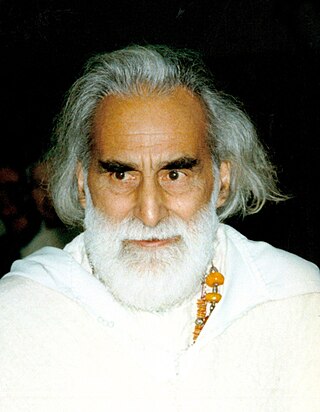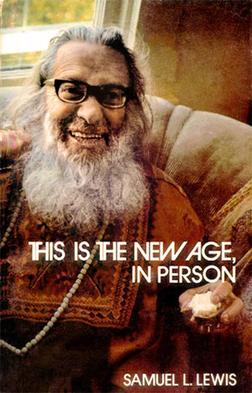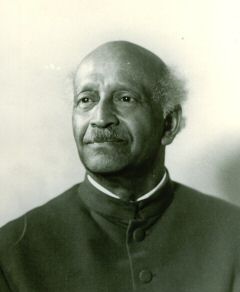
Inayat Khan Rehmat Khan was an Indian professor of musicology, singer, exponent of the saraswati vina, poet, philosopher, and pioneer of the transmission of Sufism to the West. At the urging of his students, and on the basis of his ancestral Sufi tradition and four-fold training and authorization at the hands of Sayyid Abu Hashim Madani of Hyderabad, he established an order of Sufism in London in 1914. By the time of his death in 1927, centers had been established throughout Europe and North America, and multiple volumes of his teachings had been published.

Vilayat Inayat Khan was a teacher of meditation and of the traditions of the East Indian Chishti Sufi order of Sufism. His teaching derived from the tradition of his father, Inayat Khan, founder of The Sufi Order in the West, in a form tailored to the needs of Western seekers. One of his sisters was Noor Inayat Khan GC MBE. He taught in the tradition of Universal Sufism. His parents met at the New York City ashram of American yogi, Pierre Bernard, half-brother of his mother Pirani Ameena Begum.

The Chishti order is a Sufi order of Sunni Islam named after the town of Chisht where it was initiated by Abu Ishaq Shami. The order was brought to South Asia by Mu'in al-Din Chishti in the city of Ajmer.

Pandit Pran Nath was an Indian classical singer and master of the Kirana gharana singing style. Promoting traditional raga principles, Nath exerted an influence on notable American minimalist and jazz musicians, including La Monte Young, Terry Riley, and Don Cherry. He began performing in the United States in the 1970s, and established the Kirana Center for Indian Classical Music in 1972; he subsequently taught in various universities across the US and Europe.

The Dances of Universal Peace (DUP) are a spiritual practice that employs singing and dancing the sacred phrases of the world's religions. Their intention is to raise consciousness and promote peace between diverse religions according to one stated goal. The DUP are of North American Sufic origin. They combine chants from many world faiths with dancing, whirling, and a variety of movement with singing.

Samuel L. Lewis also known as Murshid Samuel Lewis and Sufi Ahmed Murad Chisti was an American mystic and horticultural scientist who founded what became the Sufi Ruhaniat International, a branch of the Chishtia Sufi lineage. After a lifetime of spiritual study with teachers East and West, primarily Inayat Khan and Nyogen Senzaki, Lewis was recognized simultaneously as a Zen master and Sufi murshid by Eastern representatives of the two traditions. He also co-founded the Christian mystical order called the Holy Order of Mans. His early interest in international seed exchange and organic agriculture also established him as one of the pioneers of green spirituality. His most enduring legacy may be the creation of the Dances of Universal Peace, an early interspiritual practice that has spread around the world in the 50 years since his death.

Khawaja Syed Muhammad Nizamuddin Auliya, also known as Hazrat Nizamuddin, Sultan-ul-Mashaikh and Mahbub-e-Ilahi, was an Indian Sunni Muslim scholar, Sufi saint of the Chishti Order, and is one of the most famous Sufis from the Indian Subcontinent. His predecessors were Fariduddin Ganjshakar, Qutbuddin Bakhtiyar Kaki, and Moinuddin Chishti, who were the masters of the Chishti spiritual chain or silsila in the Indian subcontinent.

Hidayat Inayat Khan was a British-French classical composer, conductor and Representative-General of the Inayati Order.

Murshid is Arabic for "guide" or "teacher", derived from the root r-sh-d, with the basic meaning of having integrity, being sensible, mature. Particularly in Sufism it refers to a spiritual guide. The term is frequently used in Sufi orders such as the Naqshbandiyya, Qādiriyya, Chishtiya, Shadhiliya and Suhrawardiyya.

In Sufism, a murīd is a novice committed to spiritual enlightenment by sulūk under a spiritual guide, who may take the title murshid, pir or shaykh. A sālik or Sufi follower only becomes a murīd when he makes a pledge to a murshid. The equivalent Persian term is shāgird.

Zia Inayat-Khan is a scholar and teacher of Sufism in the lineage of his grandfather, Inayat Khan. He is president of the Inayati Order and founder of Suluk Academy, a school of contemplative study with branches in the United States and Europe.

Yakzan Hugo Valdez was a Sheikh of the Sufi Order International initiated by Pir Vilayat Inayat Khan and of the Mevlevi Order initiated by Suleyman Hayati Dede, Sheikh of Konya. Yakzan was additionally a celebrated master of the Dances of Universal Peace as originated by Samuel L. Lewis and an acknowledged peer of the Sheikhs of the Sufi Islamia Ruhaniat Society. Yakzan was a long-term resident of Honolulu, Hawaii. He established Sufi communities in Hawaii, Chile, and Spain.

Pir-o-Murshid Mohammed Ali Khan (1881–1958) was the leader of the International Sufi Movement from 1948 until his death. He was a second cousin of Inayat Khan, the grandson of Inayat's grandfather and therefore according to Indian custom considered a brother.

Musharaff Moulamia Khan was born in Baroda (India) on 6 September 1895 and died in The Hague (Netherlands) on 30 November 1967. Не was the youngest brother of Inayat Khan, and shared his delight in music. While in his teens he had just come to Calcutta to study and be under the influence of his brother when Inayat was called away to America, and Musharaff was left alone. Within a year, however, he also journeyed to the west, where he joined Inayat and became one of 'The Royal Musicians of Hindustan.'

The Inayati Order (Inayatiyya), is an international organization dedicated to spreading the Sufi teachings of Inayat Khan, a musician and mystic who first introduced Sufism to the modern Western world in 1910. The Inayati Order operates internationally through a network of centers, and offers a number of programs and activities. It is led by Zia Inayat Khan, grandson of Inayat Khan.
The Sufi Ruhaniat International (SRI) is a stream of Universal Sufism and draws inspiration from traditions of Sufism within and beyond historic Islam. SRI is an initiatic order within the lineage of Inayat Khan (Inayati-Chishtiyya). Sufi Ahmed Murad Chisti, a disciple of Inayat Khan, formally founded the order in 1970. There are centers throughout the United States, Belgium, Canada, the Netherlands and the United Kingdom.

Shah Inayatullah, popularly known as Sufi Shah Inayat Shaheed, Shah Shaheed or Shah Inayat of Jhok, was a 17th-century Sindhi Sufi saint and revolutionary from Jhok. He was the first socialist and agricultural reformist of Sindh.

Sufism in Bangladesh is more or less similar to that in the whole Indian subcontinent. India, it is claimed, is one of the five great centers of Sufism, the other four being Persia, Baghdad, Syria, and North Africa. Sufi saints flourished in Hindustan (India) preaching the mystic teachings of Sufism that easily reached the common people, especially the spiritual truth seekers in India. Sufism in Bangladesh is also called pirism, after the pirs or teachers in the Sufi tradition.
Western Sufism, sometimes identified with Universal Sufism, Neo-Sufism, and Global Sufism, consists of a spectrum of Western European and North American manifestations and adaptations of Sufism, the mystical dimension of Islam. Many practitioners of Western Sufism follow the legacy of Inayat Khan and may identify with a variety of Sufi traditions, some of which have evolved to be pluralistic and not exclusively Islamic. In addition to Western Sufism, traditional Sufism also exists in the West, although it is significantly less prevalent among Muslims in the West than Sufism in the Muslim world. Most Sufi organizations in the West outside of the Balkans are Western Sufi.

Sufism Reoriented Sanctuary is a universal spiritual retreat located in Walnut Creek, California, United States. The sanctuary is located at 11 White Horse Court. Sufism Reoriented was founded and rechristened by spiritual master Meher Baba in 1952.
















